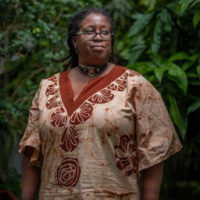
Jacqueline Patterson (Courtesy of CU Boulder)
Students and professors gathered virtually for a lecture by Jacqueline Patterson, director of the NAACP Environmental and Climate Justice Program on Feb. 9. The lecture is just one part of the year-long series entitled Deep Horizons: Making Visible an Unseen Spectrum of Ecological Casualties & Prospects which focuses on the pressing effects of climate justice on black and minority communities around the world.
“We talk about the hope and the vision of what could be if we really rise to the challenge of the transformation that we need to make,” Patterson said.
Members of Baytown, Texas, a community affected by petrochemical plants in the vicinity, made a video that Patterson shared. The performers read poetry and performed dances that represented their experiences living in this town. They were often seen wearing masks and gloves.
Patterson pointed to the “reality of not being able to breathe” in many communities far before the implementation of mandates for these items due to the global pandemic.
“Who is accessing and who is paying the cost?” Patterson asked rhetorically. Climate injustice causes disparities in many communities that are primarily low income and communities of color. Patterson discussed issues ranging from pollution to natural disasters.
“We know that communities are disproportionately impacted by the pollution, but those very same communities that are more likely to host those facilities [that release pollutants] are also communities that are low-income and are more likely to have their utilities shut off for non-payments,” Patterson said, relating the impacts of climate change and economic disparity.
Everything is connected in alarming ways, especially in regard to health issues. Pollutants cause asthma in many children. The food system and the treatment of animals are also causing health problems.
Patterson explained the changes we must make to combat these issues.
“The systems that we need to change are all of our systems,” Patterson said. She added that every system, from political systems, economic systems, food, water and waste systems, energy, transportation, and more, are all implicated in the situation.
“Immigration rights is gender justice is climate justice is economic justice and so forth,” Patterson said. She explained that addressing the intersectionality of these matters is a way to combat the division that is occurring.
Communities are striving to overcome these issues, fighting for clean energy, building local food movements, and obtaining positions of leadership.
“We push back on the bad and push forward on the good,” Patterson said.
Contact CU Independent Staff Writer Erica McNamee at Erica.McNamee@Colorado.edu
